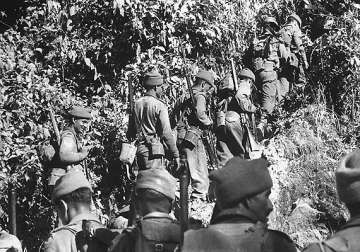New Delhi, May 6 : As Indian and Chinese troops pulled back on Sunday evening in the Daulat Beg Oldi sector of Ladakh, where the Chinese had made an incursion of up to 17 km, let's take a look at the place where our under-fed and under-armed brave jawans in the 1962 war fought till their last drop of blood to fend off the Chinese attack.
Daulat Beg Oldi lies at the easternmost point of the Karakoram Range in a cold desert region in the far north of India, just 8 km south of the Chinese border and 9 km northwest of the Aksai Chin Line of Actual Control between China and India.
Other than Siachen Glacier military bases, it is India's northernmost built-up area.
The nearest inhabited town is Murgo to the south, which has a small population of Baltis who primarily depend on apricot farming and yak rearing.
The government in 2001 first announced plans to construct a motorable road from Leh to its end at Daulat Beg Oldi.
Temperature plummets as low as -30 degrees Celsius in winter. The weather deteriorates frequently with strong icy winds lashing much of DBO.
DBO has very little if any vegetation or wildlife. Communication is possible only through INMARSAT (satellite) phones.
The place is named after Daulat Baig Oldi, a 16th century Yarkandi nobleman who is supposed to have died at this place after descent from the Karakoram Pass, which is 17 kilometers to the northwest on the Indo-Chinese border.
This route was used by caravans of traders traveling between India and Central Asia.
It used to be a stopping point for the caravans traveling along the Silk Road. India and China sealed their borders after the 1962 India-China War, ending most of the cross-border trade. In modern times, the place has not been known to have any permanent civilian population.
In April 2013, a platoon-sized contingent of the Chinese People's Liberation Army set up camp 10 km inside of the Indian side of the LAC in Daulat Baig Oldi. Chinese military helicopters also violated Indian airspace during the occupation.
The Indian Army maintains helipads and a gravel air strip here, the highest airstrip in the world.
Routine sorties are carried out using AN-32 aircraft to provide relief and supplies to the troops stationed nearby.
The base was established during the Sino-Indian war in 1962, with the first landing by Squadron Leader C.K.S Raje who set a record for the world's highest aircraft landing at the time.
It was operated with American-supplied Fairchild Packets from 1962 to 1966, when it had to be closed down suddenly when an earthquake caused loosening of the surface soil, making the area unsuitable for fixed-wing aircraft.
Latest India News
